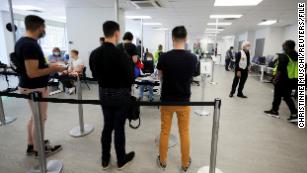Chinese don't play cricket because they eat the bats
Used to be a silly joke.
No one is laughing as a new virus comes from the CCP.
https://edition.cnn.com/2022/08/17/opinions/health-care-future-predictions-sepkowitz/index.htmlMany may wonder just what is going on here. Why are so many infections appearing so quickly? Several explanations are plausible: Perhaps a globally warmed and densely populated world is more hospitable to all sorts of new pathogens; perhaps new molecular techniques are allowing us only now to diagnose the cause of the endless unnamed sniffles, colds and rashes that previous generations could not name, creating a concrete "outbreak," not just a "lousy winter."Alternatively, maybe the increasing distrust of science behind the refusals to vaccinate or wear a mask has pushed centuries of medical progress back toward the days of pre-Enlightenment, when only prayer and perhaps a few coins for an indulgence could determine a fate, or perhaps it is the internet feeding a clickbait craving for health scares as if they were scary movies.Whatever is happening, the moment has created a scramble to find someone who can predict the future, no experience necessary. This search for a crystal ball specialist goes back millennia: The Oracle of Delphi dominates stories from ancient Greece, while astrologers and clairvoyants have filled a similar role for centuries.Among those with at least a few toes in the scientific world, we have weather forecasters, stock market analysts, political pollsters and Vegas oddsmakers -- all of whom are doing their best, but in the final analysis, just guessing, however educated the attempt.To this list has been added, uncomfortably, a new mythic creature: the public health expert who is able to see the future accurately and declaim what, if anything, we might need to do to stay safe. This is a mighty tall order. We are more than 2 ½ years into the pandemic, and our predictions don't seem to be improving much.The twists and turns of the Covid-19 pandemic have humbled us all, possibly compromising the future of predicting the future. Forecasting what might be ahead, even when you know a subject inside out, requires a weird mishmash of expertise, insight, intuition, bravado if not egotism and a taste for the dramatic. But being second- and third-guessed repeatedly threatens to result in timidity and procrastination -- the worst traits for anyone trying to prepare for tomorrow. Add in the harsh headwinds provided by an enraged anti-vaccine, anti-science, noisy minority and the task is even more difficult.
- Forums
- Political Debate
- Langya Virus new "gift" from China
Chinese don't play cricket because they eat the batsUsed to be a...
- There are more pages in this discussion • 35 more messages in this thread...
You’re viewing a single post only. To view the entire thread just sign in or Join Now (FREE)











